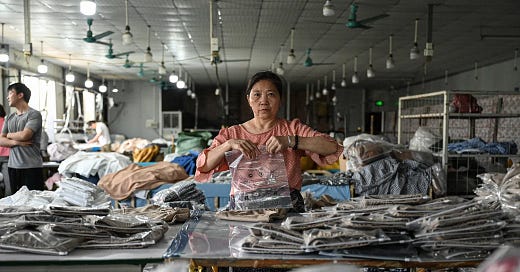Common Threads Round Up #21
We got locked out of our substack, so here's an extra long post to make up for the few weeks that we've been away. Tariffs, inventory, Shein and more!
🗓️ Friday, June 20th 2025
Source: Foreign Policy
📦 Retail’s Looming Inventory Problem - BOF
Retail’s still dealing with its pandemic-era hangover, and Cathaleen Chen breaks it down in her latest for Business of Fashion: too much product in some places, not enough in others, and no one totally sure how to fix it.
Brands tried to play it safe by ordering less, but when demand snapped back, shelves stayed empty. Now some are sitting on piles of unsold stuff while others are scrambling to meet basic demand. The takeaway? Forecasting is broken, and the current system isn’t built for how people actually shop now. Inventory is no longer just a backend problem—it’s a business model problem.
💚 Akyn’s Amy Powney on starting a responsible brand from scratch - Vogue Business
What does it take to launch a sustainable brand in 2025? Bella Webb profiles Amy Powney (formerly of Mother of Pearl) for Vogue Business, as she introduces Akyn—a new label built around doing better without making it a personality trait.
Think regenerative cotton, RWS-certified wool, flax—and no performative greenwashing. Just well-made pieces, full transparency, and a vibe that says “thoughtful” not “exhausted.” There was another interview with Amy in The Guardian this week about her new brand and her work across two decades in the sustainable fashion space. In case you want more info on Amy, there was another article in Financial Times that shows more pieces from her new collection (go Amy’s PR team!)
🪑 Sustainability Takes a Back Seat, Even at Sustainable Fashion Brands - BOF
At the same time when Amy’s launching her new sustainable brand, BOF put out this interesting piece that highlights several ‘sustainable’ brands who are not marketing their products as sustainable-first. Whether it’s consumer fatigue, greenwashing, Sarah Kent highlights how sustainability has become less of a purchasing decision for consumers.
There was a great piece from Vogue UK a few days ago that posed a similar question of how brands should be and can most effectively be highlighting sustainability to consumers these days.
🚫 The End of Fast Fashion - NY Times
If you’ve ever read Common Threads before, you know that we love to talk about tariffs, the de minimis exception, and Shein and Temu. So naturally, we had to include this piece from The Daily that breaks down what happens when fast fashion brands suddenly have to play by the same rules as everyone else. Spoiler: it’s going to get harder to sell $5 dresses with free shipping.
The bigger picture? The U.S. is using trade policy to call time on ultra-fast fashion’s free ride.
On this topic, Shein raised prices in response to the tariff changes. There was also a good article a few days ago from BOF about how Shein, despite how hard it’s trying, can’t clean up its image, which makes us happy that consumers aren’t falling for the greenwashing they’re putting out there.
🇫🇷 Can France’s Fast Fashion Law Cure Shein's Ills? - HypeBeast
Meanwhile, in France a law was passed that might ban ads from ultra-fast fashion brands like Shein and Temu + more. Here’s another good article about this from WWD.
🛍️Let’s talk Temu. We normally talk about Shein on here, but Temu is just as bad when it comes to fast fashion.
Some interesting things have been happening here. Earlier in May, Temu stopped selling goods directly to the US as the de-minimis loophole ended. The US users dropped by 48% and Temu shifted its focus to Europe, but as mentioned above, they aren’t exactly getting a warm welcome…And then just 5 days ago, it was announced that Temu is back to selling directly to US consumers. Interesting to keep an eye on if they’re able to rebound from this and if ad spend once again increases…
Very long article title, but also a very interesting topic on a unique implication of tariffs. Businesses are having to place orders earlier than expected (especially during this period of uncertainty of ‘will they, won’t they’ happen of tariffs). These earlier orders mean that brands have to predict trends even further in advance, which will in turn affect accuracy of these predictions and therefore the sell rate. And as we mentioned before, brands are already dealing with a significant excess inventory issue…
Something else interesting, buyers are still wary of tariffs and have expressed openness to switch to different cheaper brands should their go-to raise their prices. Probably a lot of opportunity here for new domestic businesses to acquire consumers.
🏭 Inside Walmart’s Ambitious Plan To Make Your Clothes In America Again - Fast Company
Liz Segran takes a look at what Walmart is doing to combat tariffs and produce more American-made goods. unspun and out partnership with Walmart gets a nice shout-out :)
🍊 Loewe is making shirts with Orange Peels - HighSnobiety
We like how their IG caption calls out that this isn’t new, but nice to see something like this adopted by a luxury brand. Loewe does such a good job at storytelling too - here’s their TikTok video announcing this line.
📝 Will Trump and the EU Kill Fast Fashion? - Foreign Policy
This article mentions a lot of the conversation around tariffs and fast fashion - but the interesting part is at the bottom where it outlines global regulations that are coming into play around the world and how those (in addition to tariffs) might finally spell real lasting trouble for fast fashion brands.
🛑 U.S. delays threatened 50% tariff on the European Union until July, Trump says - PBS
ICYMI - EU tariffs are delayed again.
That’s it for now! Until next week 🤙
Thanks for reading Common threads! Subscribe for free to receive new posts.





